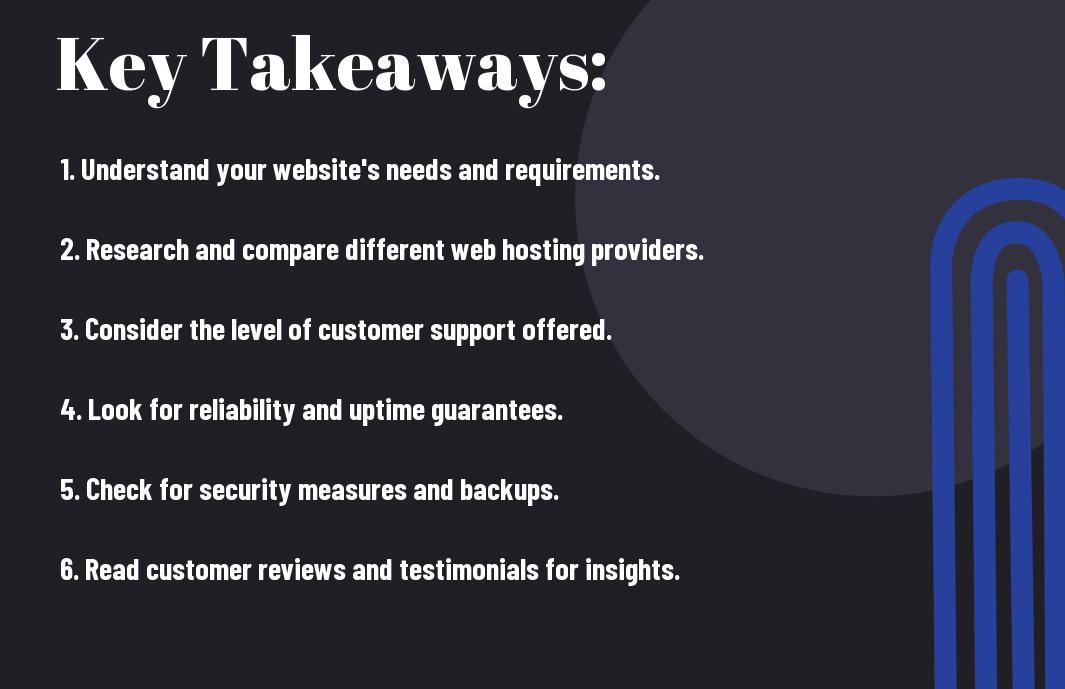Selecting the right web hosting service for your website can be a daunting task, given the myriad of options available in the market. However, with the increasing number of cyber threats and the importance of website performance, it is crucial to choose a reliable web hosting service that can provide you with a secure and efficient online platform. When it comes to making this decision, there are several key factors that you should consider to ensure that you are getting the best service for your specific needs. In this blog post, we will outline important considerations to keep in mind when selecting a web hosting service, so you can make an informed and confident decision for your website’s online presence.
Key Takeaways:
- Research Your Options: Before settling on a web hosting service, take the time to research and compare different providers to ensure you choose the best fit for your website’s needs.
- Consider Reliability and Uptime: Look for a web hosting service that guarantees a high level of reliability and uptime, ensuring that your website remains accessible to visitors at all times.
- Look for Good Customer Support: Choose a web hosting service with a reputation for excellent customer support, as you may need assistance at some point and it’s crucial to have a reliable and responsive support team to help you resolve any issues.

Understanding Web Hosting Basics
Obviously, web hosting is a service that allows individuals and organizations to post a website or web page onto the Internet. A web hosting service provider is a business that provides the technologies and services needed for the website or webpage to be viewed on the Internet. Websites are hosted or stored on special computers called servers.
Different Types of Hosting Services
When it comes to selecting a web hosting service, it’s important to understand the different types available. Shared hosting is the most common and affordable option, where your website shares server space with other sites. Dedicated hosting provides you with your own server and greater control, but comes at a higher cost. VPS hosting offers a middle ground between shared and dedicated hosting. Cloud hosting uses the resources of several clustered servers, offering seamless scalability for your website. WordPress hosting is designed specifically for WordPress websites, offering enhanced performance and security.
- Shared hosting – Most common and affordable option
- Dedicated hosting – Your own server with greater control
- VPS hosting – Middle ground between shared and dedicated hosting
- Cloud hosting – Scalability with clustered servers
- WordPress hosting – Designed for WordPress websites
The type of hosting you choose will depend on the size and traffic of your website, as well as your technical needs. The right hosting plan can significantly impact the performance of your website.
Bandwidth and Storage Considerations
When selecting a web hosting service, considering bandwidth and storage is crucial. Bandwidth determines how much data can be transferred to and from your website. Storage, on the other hand, is the amount of space your website has for storing files, images, videos, and more. You need to ensure that your hosting plan offers enough bandwidth and storage to accommodate your website’s needs. Additionally, consider the potential for growth and whether the hosting service provider offers options for scaling up your resources as your website expands.
Evaluating Web Hosting Providers
Now that you understand the basics of web hosting and the different types available, it’s time to dive into the process of evaluating web hosting providers. It’s essential to carefully assess each potential provider to ensure that they can meet your specific needs. For a more in-depth guide on this topic, you can also check out How to Choose a Web Hosting Provider – Exposure.
Reputation and Reliability
When evaluating web hosting providers, one of the most critical factors to consider is their reputation and reliability. You want to be sure that the company you choose has a solid track record of providing consistent service and reliable uptime. Look for customer reviews and testimonials to get an idea of their performance and reliability. Additionally, consider the company’s history and how long they have been in business.
Customer Support and Service Level Agreements
Another crucial aspect to evaluate when choosing a web hosting provider is their customer support and service level agreements. You want to ensure that you will have access to reliable and efficient customer support whenever you need it. Check their support options, such as live chat, phone support, and ticket submission, to see if they align with your preferences. Additionally, review their service level agreements to understand what level of guaranteed service and uptime they offer.
Advanced Hosting Features
After you have considered the basic features and reliability of a web hosting service, it’s time to take a look at its advanced hosting features. These features can enhance the performance, security, and scalability of your website, making them crucial for your online presence. Here are some advanced hosting features to look out for:
- Reliability and uptime guarantee: Ensure that the hosting service offers a high uptime guarantee, ideally 99.9% or higher, to keep your website accessible to visitors.
- Scalability: Look for a hosting service that allows you to easily upgrade your resources as your website grows, ensuring it can handle increased traffic and data.
For more in-depth information on advanced hosting features, you can refer to the article on Seven Factors To Consider When Choosing A Reliable Web Hosting Company by Forbes. The article provides valuable insights into the advanced features that can impact the performance and reliability of a web hosting service. You can review the information in the table below:
| Factors | Impact |
| Server reliability and uptime | Ensures your website is consistently accessible to visitors |
| Scalability and resource flexibility | Allows you to accommodate growth and handle increased traffic |
Security Measures and Backups
When it comes to the security of your website, you must prioritize a web hosting service that provides robust security measures and reliable backups. Ensuring the safety of your website’s data and protecting it from potential threats should be a top priority. Look for a hosting service that offers features such as SSL certificates, regular security updates, firewall protection, and automated backups to keep your data secure at all times. Regular backups are essential in the event of data loss or unexpected issues, allowing you to restore your website to a previous state without losing valuable data.
Scalability and Performance Optimization
As your website grows, having the ability to scale your resources is crucial to accommodate increased traffic and maintain optimal performance. You should select a web hosting service that offers scalability options, allowing you to upgrade resources seamlessly without causing disruptions to your website. Additionally, performance optimization features such as content delivery networks (CDNs), caching mechanisms, and server-level optimizations can significantly enhance your website’s speed and overall performance, providing a better experience for your visitors.

Making the Decision
For further guidance on choosing a reliable web hosting service, you can refer to 10 Tips for Choosing the Right Web Hosting Company. This resource provides valuable insights to help you make an informed decision.
Comparing Costs and Value Propositions
When comparing web hosting services, it’s important to weigh the costs against the value propositions offered. Consider the features and resources included in a package, as well as any additional benefits such as free domain registration and email accounts. Take a close look at the pricing structure and ensure that you are getting the most value for your money. Here’s a simplified breakdown for easy comparison:
| Web Hosting Company A | Web Hosting Company B |
| Monthly Cost | Monthly Cost |
| Storage Space | Storage Space |
| Bandwidth | Bandwidth |
| Additional Features | Additional Features |
Reading Reviews and Seeking Recommendations
Before making a decision, take the time to research and read reviews of different web hosting services. Look for feedback from current or previous customers to gain insights into their experiences. Additionally, seek recommendations from industry professionals or peers who have had positive experiences with web hosting providers. Anecdotal evidence can be a powerful tool in making your decision.
Conclusion: Tips for Choosing a Reliable Web Hosting Service
Ultimately, when it comes to choosing a reliable web hosting service for your website, it is important to consider several factors. You should carefully assess your needs, such as the amount of traffic your site receives and the type of content you are hosting. It is also crucial to do thorough research on different web hosting providers, considering factors like uptime, customer support, and security features. Additionally, reading reviews and seeking recommendations from other website owners can provide valuable insights into choosing the right web hosting service for you. By taking these tips into consideration, you can ensure that your website is in good hands and will be accessible to your audience at all times.
FAQ
Q: What factors should I consider when choosing a reliable web hosting service?
A: When choosing a web hosting service, consider factors such as uptime, customer support, security, bandwidth, and scalability. Uptime is crucial for your website’s availability, while strong customer support ensures you can quickly resolve any issues. Security is essential to protect your website and customer data, while adequate bandwidth and scalability ensure your website can handle increasing traffic and growth.
Q: How important is uptime when selecting a web hosting service?
A: Uptime is critical when choosing a web hosting service. It refers to the amount of time your website is accessible and operational. Look for a web hosting service with a guaranteed uptime of at least 99.9%. Any lower and your website could experience significant downtime, negatively impacting your business.
Q: What type of customer support should I expect from a reliable web hosting service?
A: A reliable web hosting service should provide 24/7 customer support through various channels such as phone, live chat, and email. The support team should be knowledgeable, responsive, and able to assist with technical issues, billing inquiries, and any other concerns you may have.
Q: How does security play a role in choosing a reliable web hosting service?
A: Security is a crucial consideration when selecting a web hosting service. Look for features such as SSL certificates, regular backups, malware detection and removal, and DDoS protection. A reliable web host should prioritize the security of your website and data to prevent any unauthorized access or cyber attacks.
Q: What should I look for in terms of bandwidth and scalability when choosing a web hosting service?
A: When selecting a web hosting service, ensure that the provider offers sufficient bandwidth to accommodate your website’s traffic. Additionally, consider scalability, as your website may experience growth over time. Look for a hosting service that allows you to easily upgrade your plan or resources as your website’s needs evolve.
CATEGORY:Web Hosting

